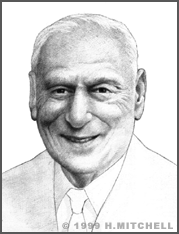Robert Rines
Few Americans have made such a sweeping contribution to the process and business of inventing as Robert Rines, a trailblazer in the realms of invention, education, law, and public policy.
Rines was born in 1922 in Boston, Massachusetts. He earned a bachelor’s degree in physics from MIT, graduating just before the U.S. entered World War II as a star pupil of MIT's then new Radiation Laboratory. Rines joined the U.S. Army Signal Corps as an expert in high resolution image-scanning radar; there, his inventions were essential in building the Army's top-secret Microwave Early Warning System.
Upon his return from the European and Pacific Theatres, Rines earned a law degree from Georgetown University (1946). Rines specialized in patent law, and even served as a patent examiner for the U.S. Patent Office at that time.
Most of Rines' own patents, which now number more than eighty, are for electronic apparatus that improve the resolution of radar and sonar scanning. Besides systems that provide early warning of bomb and missile attacks, Rines' inventions have refined boat and air navigation systems, as well as medical ultrasound scanners.
Rines has not only invented, he has supported invention. In 1973, he founded the Franklin Pierce Law Center in New Hampshire, which has remained the nation's foremost institute for the study of intellectual property law. Since the 1970s, Rines has been an expert in international patent law issues as well: he has been a member of the Technical Advisory Board of the U.S. Department of Commerce, and he played a major role in revising the patent system of Taiwan (at whose Chiao Tung University he earned a PhD in 1972).
In 1997, Rines made a splash in the popular press, when PBS' Nova series aired a documentary of his 1975 collaboration with MIT's Doc Edgerton, using advanced scanning technology to hunt the Loch Ness Monster. The results were no more than tantalizing; but had been the most scientific effort to solve that mystery.
Rines was the founder and president of the Academy of Applied Science, a non-profit organization that promotes and rewards invention among both the young and the old. Among other duties, Rines was a Lecturer in intellectual property issues at Harvard, MIT, and Franklin Pierce Law Center (where he is also Chairman of the Board of Overseers). In 1994, Rines was inducted into the Inventors Hall of Fame.
He passed away on November 1, 2009 in Boston, MA.


